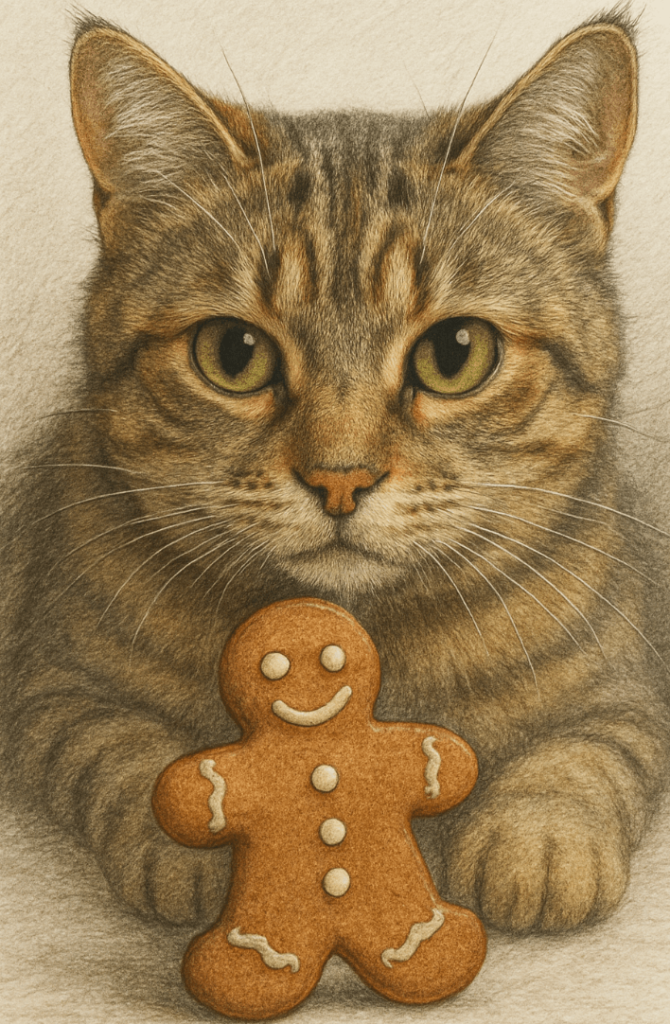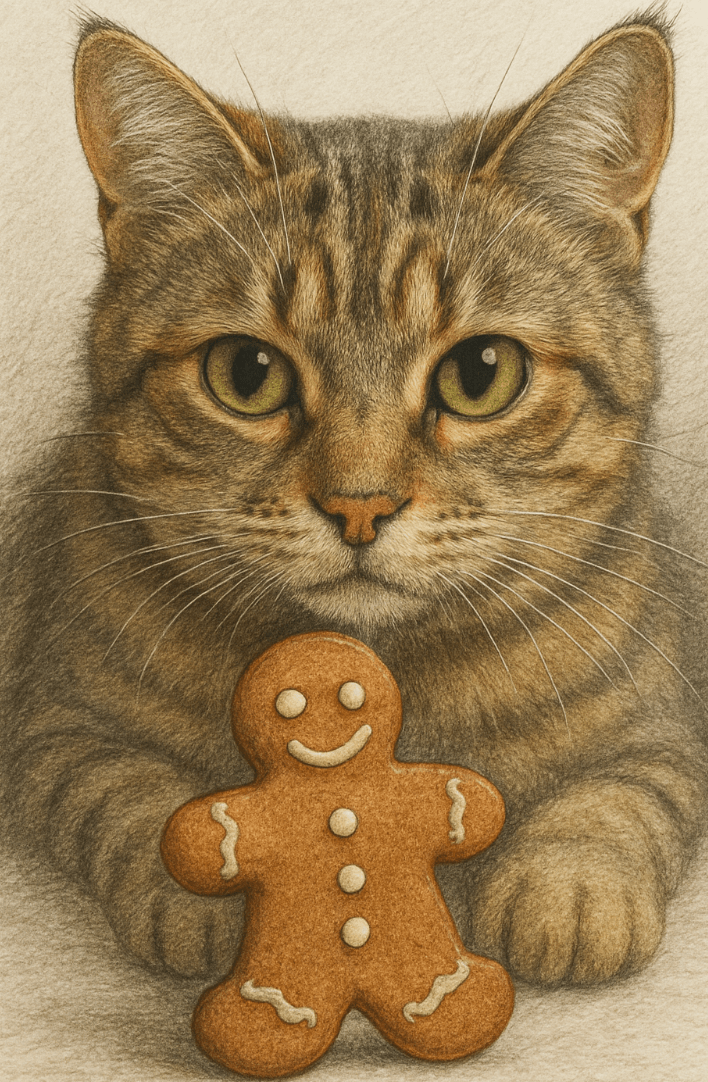Can Cats Eat Gingerbread?
The holiday season is a time of joy, warmth, and delicious treats like gingerbread. Whether it’s cookies, houses, or decorations, gingerbread is a staple in many households. But what happens if your curious feline companion takes an interest in this festive snack? Can cats eat gingerbread safely, or should it be kept far out of their reach? While gingerbread might smell irresistible to us, it’s important to understand how its ingredients could affect your cat’s health. In this blog post, we’ll explore whether gingerbread is safe for cats, potential risks, and safer alternatives to keep your furry friend happy during the holidays.
Key Ingredients in Gingerbread That Could Harm Cats
Gingerbread contains several ingredients that are not only unsafe for cats but could also pose serious health risks. Understanding these components will help you make informed decisions about sharing holiday treats with your pet.
Sugar:
High sugar content can lead to obesity, diabetes, and dental issues in cats. Their bodies aren’t designed to process large amounts of sugar.Spices (Cinnamon, Nutmeg, Cloves):
While small amounts of cinnamon may not be toxic, nutmeg contains myristicin, which can cause hallucinations, seizures, or gastrointestinal upset in cats.Ginger:
Although ginger in tiny amounts might aid digestion, larger quantities can irritate a cat’s stomach or cause allergic reactions.Chocolate (if included):
Many gingerbread recipes include chocolate, which contains theobromine—a toxic compound for cats that can lead to vomiting, diarrhea, or even seizures.Artificial Additives:
Preservatives, flavorings, and food coloring often found in store-bought gingerbread can upset your cat’s digestive system.
These ingredients highlight why gingerbread is not a safe treat for cats and should be avoided entirely.
Signs Your Cat May Have Eaten Gingerbread
If your cat accidentally ingests gingerbread, they may exhibit symptoms of discomfort or toxicity. Recognizing these signs early can help you seek veterinary care promptly.
Vomiting or Diarrhea:
Gastrointestinal upset is one of the most common reactions to consuming harmful foods like gingerbread.Lethargy or Weakness:
Toxic ingredients such as nutmeg or chocolate can cause fatigue or difficulty moving.Excessive Drooling:
This could indicate nausea or irritation in their mouth or throat caused by spices or sugar.Seizures or Tremors:
In severe cases, ingestion of nutmeg or chocolate may lead to neurological symptoms requiring immediate attention.Loss of Appetite:
If your cat refuses to eat after consuming gingerbread, it could signal internal distress or poisoning.
If you notice any of these symptoms, contact your veterinarian immediately to ensure your cat receives proper treatment.
Check this guide 👉Can Cats Eat Bone Broth? Best 7 Expert Tips!
Check this guide 👉Can Cats Eat Watermelon Seeds? Best 7 Expert Tips!
Check this guide 👉Can Cats Eat Turmeric? Best 7 Expert Tips!

Ingredients in Gingerbread | Potential Effects on Cats |
|---|---|
Sugar | Obesity, diabetes, dental problems |
Spices (e.g., nutmeg, cloves) | Hallucinations, seizures, stomach irritation |
Ginger | Mild digestive aid in small amounts; risky in excess |
Chocolate | Theobromine toxicity leading to seizures |
Artificial additives/flavorings | Digestive upset, allergic reactions |
Safe Alternatives to Gingerbread for Cats
While gingerbread isn’t suitable for cats, there are plenty of safe and healthy alternatives to share during the holidays. These options allow your feline friend to join in the festivities without compromising their health.
Plain Cooked Chicken:
A small piece of unseasoned, boneless chicken makes a protein-rich treat that cats love.Pumpkin Puree:
Plain pumpkin puree (without added spices or sugar) aids digestion and provides essential nutrients.Catnip Treats:
Homemade or store-bought catnip treats are a fun way to indulge your cat during the holidays.Small Portions of Cheese:
Most cats enjoy cheese in moderation, though lactose intolerance is common, so monitor their reaction.Specialty Cat Treats:
Look for festive-themed cat treats made specifically for felines—they’re safe and enjoyable for your pet.
These alternatives ensure your cat feels included while staying safe and healthy.
Tips for Keeping Gingerbread Away from Your Cat
Preventing accidental ingestion is key to protecting your cat during the holiday season. Follow these tips to keep tempting treats out of paw’s reach.
Store Gingerbread Safely:
Keep gingerbread cookies and decorations in sealed containers or high shelves where your cat cannot access them.Supervise Decorations:
Edible gingerbread houses or ornaments should be placed in areas inaccessible to pets.Avoid Feeding Table Scraps:
Resist the urge to give your cat bites of human food, especially baked goods, which often contain harmful ingredients.Provide Distractions:
Offer toys or interactive play to divert your cat’s attention away from tempting holiday snacks.Educate Family Members:
Ensure everyone in your household knows not to feed gingerbread or other unsafe foods to your cat.
By taking precautions, you can prevent accidents and keep your cat safe during the festivities.
Common Holiday Foods to Avoid Giving Your Cat
The holiday season brings many tempting foods, but not all are safe for cats. Here’s a list of items to avoid sharing with your feline companion.
Alcohol:
Even small amounts of alcohol can cause severe poisoning and respiratory failure in cats.Onions and Garlic:
These ingredients damage red blood cells, leading to anemia and other complications.Dairy Products (Milk, Cream):
Despite popular belief, most cats are lactose intolerant and may experience digestive upset.Raisins and Grapes:
These fruits are highly toxic to cats and can cause kidney failure.Baked Goods with Xylitol:
This artificial sweetener is extremely dangerous and can lead to hypoglycemia or liver failure.
Avoiding these foods ensures your cat stays healthy throughout the holidays.
Healthier Ways to Include Your Cat in Holiday Celebrations
You don’t need to rely on unsafe human foods to make your cat feel part of the festivities. Try these creative ideas to involve your furry friend safely.
DIY Cat Toys:
Create simple toys using materials like cardboard boxes or fabric scraps to entertain your cat during gatherings.Interactive Play Sessions:
Use wand toys or laser pointers to engage your cat in energetic play, mimicking the excitement of the season.Cat-Friendly Snack Bar:
Set up a special area with safe treats like pumpkin puree or freeze-dried meat snacks just for your cat.Decorate for Your Cat:
Hang cat-safe ornaments low enough for them to bat around and explore safely.Quiet Retreat Space:
Provide a cozy corner or room where your cat can retreat if they feel overwhelmed by holiday chaos.
These ideas ensure your cat feels included without compromising their well-being.
How to Handle Accidental Food Ingestion by Your Cat
Accidents happen, especially during busy holiday seasons. Knowing how to respond if your cat eats something unsafe can save valuable time and reduce stress.
Stay Calm and Assess the Situation:
Determine what and how much your cat consumed to provide accurate information to your vet.Call Your Veterinarian Immediately:
Even if symptoms haven’t appeared yet, professional guidance is crucial for preventing complications.Do Not Induce Vomiting Without Guidance:
Attempting to induce vomiting at home can worsen the situation unless explicitly instructed by a vet.Monitor Closely for Symptoms:
Watch for signs of distress, such as vomiting, diarrhea, lethargy, or difficulty breathing.Keep Dangerous Foods Out of Reach Moving Forward:
Learn from the incident and take steps to prevent future accidents, ensuring your cat’s safety.
Quick action and clear communication with your vet can make all the difference in protecting your cat’s health.
Frequently Asked Questions About Cats and Gingerbread
Is a small bite of gingerbread okay for my cat?
Even a small amount can upset your cat’s stomach due to sugar, spices, or other harmful ingredients. It’s best to avoid it altogether.
What should I do if my cat eats gingerbread?
Even a small amount can upset your cat’s stomach due to sugar, spices, or other harmful ingredients. It’s best to avoid it altogether.
Are homemade gingerbread recipes safer for cats?
Even a small amount can upset your cat’s stomach due to sugar, spices, or other harmful ingredients. It’s best to avoid it altogether.
Can cats eat plain ginger?
In very small amounts, plain ginger might aid digestion, but it’s safer to consult your vet before offering it to your cat
Why is chocolate so dangerous for cats?
Chocolate contains theobromine, which cats cannot metabolize efficiently, leading to toxicity and serious health issues.
Prioritizing Your Cat’s Health During the Holidays
While gingerbread is a delightful treat for humans, it’s simply not suitable for our feline friends. From harmful spices to excessive sugar and potential toxins, the risks far outweigh any perceived benefits. By understanding what makes gingerbread unsafe and offering healthier alternatives, you can ensure your cat enjoys the holiday season safely. Remember, prevention is always better than cure—keep tempting treats out of reach and focus on providing pet-safe activities instead. With a little planning and care, you and your cat can celebrate the holidays together happily and healthily.
Do Cats Have Taste Buds? Best 7 Expert Tips! – Discover how cats experience flavors and why their taste is so unique.
Do Dogs Have Taste Buds? Best 7 Expert Tips! – Discover how dogs experience taste, their preferences, and what it means for their diet and health.
Can Cats Taste Sweet? Best 7 Expert Tips! – Discover why cats can’t taste sweetness, how it affects their diet, and tips to keep them healthy and happy.
Can Dogs Taste Sweet? Best 7 Expert Tips! – Discover how dogs perceive sweetness, which foods are safe, and tips to manage their sweet cravings responsibly.





